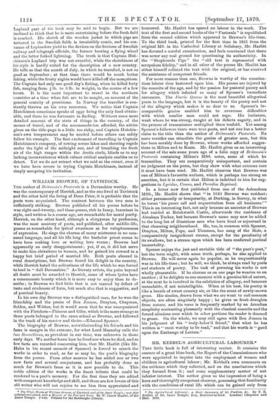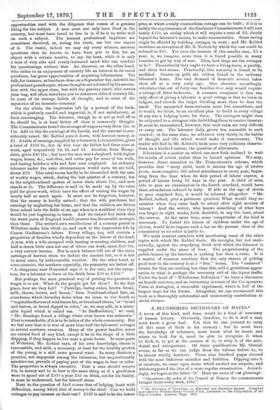MR. KEBBEL'S AGRICULTURAL LABOURER.* THIS little book is full of
interesting matter. It contains the essence of a great blue-book, the Report of the Commissioners wha were appointed to inquire into the employment of women and children in agricultural labour ; Mr. Kebbel's own comments on the evidence which they collected, and on the conclusions which they formed from it ; and some supplementary matter of not inferior interest. The author gives us the impression of being a keen and thoroughly competent observer, possessing that familiarity with the conditions of rural life which can be gained only from
• The Agricultural Labourer a Short Summary of his Position, kc. By T. E. Lebbel, of the Inner Temple, Esq., Barrister-at-Law. London : Chapman and Hall. 1870.
opportunities used with the diligence that comes of a genuine liking for the subject. A man must not only have lived in the country, but must have loved to live in it, if he is to write well on such a subject. The keenest professional inquirers are sometimes deceived, or, seeing the truth, see but one aspect of it. The rustic, indeed we may say every witness, answers questions that he knows to have been put to him for an object with a certain reserve, to say the least, while it is only a man of very able and evenly-balanced mind who can conduct his questionings without bias. An observer, on the other hand, who unites to an enjoyment of country life an interest in its social questions, has great opportunities of acquiring information. The talk, for instance, at luncheon-time on a September day, not with the professional gamekeeper, whose thoughts are coloured by his associa- tion with the upper class, but with the genuine rustic who carries your bag, will often introduce you to unknown sides of country life, to some of its strange habits of thought, and to some of the mysteries of its domestic economy.
On the whole, the impression left by a perusal of the book, which is perfectly candid and impartial, is, if not satisfactory, at least encouraging. The labourer, though he is not as well off as he should be, is at least better off than is commonly thought. The Commissioners found the average of wages to vary from 15s. to lie. Add to this the earnings of the family, and the amount is con- siderably raised. Mr. Kebbel puts it down, with harvest-money, at £1. A table of earnings, supplied by a farmer in Leicestershire, gives a total of £103 9s., but in this case the father had three sons at work, aged respectively 19, 16, and 14. Another, from Hamp- shire, gives £86 17s. ; but here the man was a shepherd, with higher wages, house, &c., rent-free, and extra pay for some of his work, and having besides a wife and four sons employed. An ordinary labourer under the same circumstances would earn, we are told, about £70. This total seems hardly to be reconciled with the rate of weekly wages, which, during the last quarter of a century, has in the neighbourhood spoken of never risen above lls., and now stands at 9s. The difference is said to be made up by the rates paid for piece-work, which have the effect of raising the wages by nearly half as much again. It must not be forgotten, however, that the money is hardly earned ; that the wife purchases her earnings by neglecting her home, and that the children are driven from school into the fields at an age when in a wealthier class they would be just beginning to learn. And we cannot but think that the worst parts of England would present less favourable averages than those. The writer's own recollections of a country parish in Wiltshire make him think so, and such is the impression left by Canon Girdleatone's letters. Every village, too, will contain a proportion of families wholly dependent on the labour of the head. A man, with a wife occupied with bearing or nursing children, and half-a-dozen little ones not one of whom can work, must find 10s. a very narrow income. Nor is much balance left out of the extra earnings of harvest when we deduct the amount lost, as it is lost in many cases, by unfavourable weather. On the other hand, in some counties, the northern especially, the peasantry are better off. "A clergyman near Doncaster says it is the rule, not the excep- tion, for a labourer to leave at his death from £50 to £150."
But perhaps the most practical way of putting the question of wages is to ask : What do the people get for them ? In the first place, how are they fed ? " Porridge, barley cakes, brown bread, milk, cheese, butter, and bacon," form Northumberland fare, an abundance which dwindles down when we come to the South to " vegetables flavoured with bacon fat, or bread and cheese," or " bread and butter, or bread dipped in cider," or, we may add, in a miser- able liquid which is called tea. " In Staffordshire," we read, "Mr. Stanhope found a village where even bacon was unknown." That is remarkable, if it is to be taken of the whole community. But we feel sure that it is true of more than half the labourers' cottages in several southern counties. Many of the poorer families never see animal food of any kiid, except it be in the shape of a little dripping, if they happen to live near a great house. In some parts of Wiltshire, Mr. Kebbel says, of his own knowledge, cheese is inaccessible, and milk, a necessary, at least for the healthy growth of the young, is a still more general want. In many districts a practice, not unpopular among the labourers, but unquestionably mischievous, prevails of paying part of the wages in beer or cider. The proportion is always excessive. That a man should receive 10s. in money and ls. in beer is the same thing as if a gentleman were to spend out of £500 a year £45 on drink, not for his family, it must be understood, but for himself alone.
Next to the question of food comes that of lodging, beset with difficulties, among which that of money is the chief. Can wo build cottages to pay interest on their cost? £120 is said to be the lowest price at which a really commodious cottage can be built ; if it is to satisfy the requirements of the Enclosure Commissioners it will cost nearly £150, an outlay which it will require a rent of £9, clearly beyond the labourer's means, to make remunerative. Some saving might be effected by building cottages in rows ; and Mr. Kebbel mentions an invention of Mr. B. Nichols by which the cost could be reduced to £85. Yet even the interest of this smaller sum, £5 a year, is, we imagine, more than it is found possible in many counties to get by way of rent. Then, how large are the cottages to be ? Theoretically they ought to have a living-room, a pantry, and three bed-rooms. Practically, this necessity is found to be modified. Grown-up girls are seldom found in the ordinary labourer's home. The vast demand of domestic service takes them off at a very early age. One observer accordingly calculates that out of forty-one families three only would require a cottage of three bedrooms. A common complaint is that the only effect of giving a labourer a good cottage is that he takes in lodgers, and crowds the larger dwelling more than ho does the small. The unmarried farm-servants must live somewhere, and it would, we think, be an excellent plan to build in every village of any size a lodging-house for them. The cottagers might then be subjected to a stringent rule forbidding them to receive inmates. It must be remembered, however, that such rules are very difficult to carry out. The labourer daily grows less amenable to such control ; at the same time, he advances very slowly in the habits of thought and life which would make it unnecessary. The reader will find in Mr. Kebbel's book some very judicious observa- tions on a kindred matter, the question of allotments.
Education is a matter on which one now feels inclined to wait for results of action rather than to hazard opinions. We may, however, direct attention to Mr. Tremenheere's scheme, which provides that " every child, until it attains the age of twelve years, must complete 160 school attendances in every year, begin- ning from the time when its first period of labour expires, a period of labour being 72 days in the year. A child of nine, able to pass an examination in the fourth standard, would have these attendances reduced to sixty. If able at the age of eleven to pass standard five, it would be released altogether. " Mr.
Kebbel, indeed, puts a pertinent question, What would they re- member when they came back to school after eight months of labour ? And the writer, who knows something of what boys can forget in eight weeks, feels doubtful, to say the least, about the answer. At the same time, some compromise of the kind is necessary. To forbid the labour of children under the age of eleven, would be to impose such a tax on the poorest class of the community as no other is liable to.
We must content ourselves with mentioning some of the other topics with which Mr. Kebbel deals. He inveighs, but not unde- servedly, against the stupefying drink with which the labourer is supplied under the name of beer. The proprietorship of the public-houses by the brewers is nothing less than a curse. It is a matter of common notoriety that the only chance of getting good beer in the country is at a " free " house. The " enslaved" houses, for they are nothing less than this, add a gratuitous aggra- vation to what is perhaps the necessary evil of the liquor traffic. Under the bead of " Wholesome Influences " we have a discussion on benefit societies, and an interesting account of the Co-operative Farm at Assington, a successful experiment, which is full of the largest hope for the future. Altogether, we can recommend this book as a thoroughly substantial and trustworthy contribution to social science.































 Previous page
Previous page